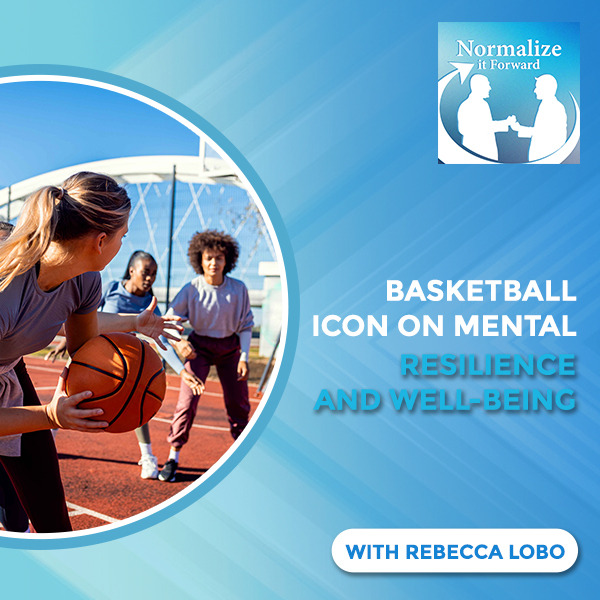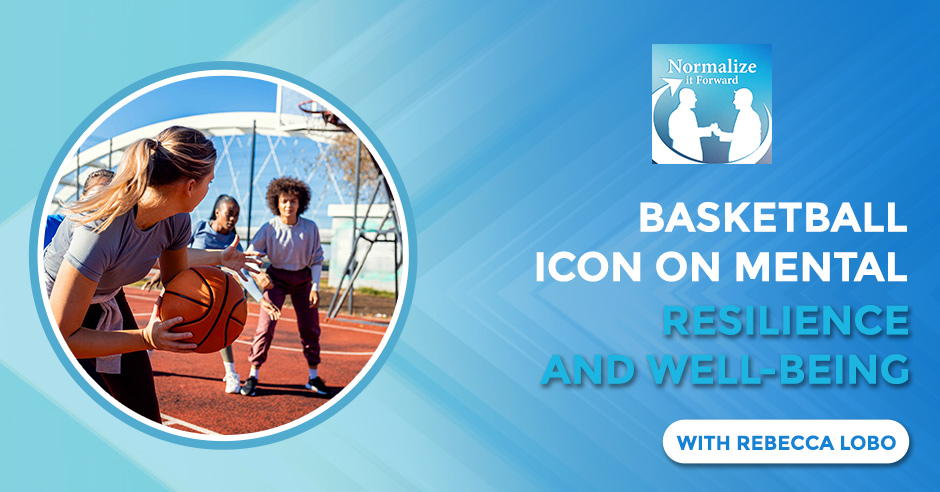
Mental resilience is crucial for navigating the challenges of any high-pressure environment. In this inspiring episode, host Marc Lehman welcomes basketball icon Rebecca Lobo to discuss its pivotal role, particularly within the world of athletics. Rebecca, known for her standout career at the University of Connecticut and as one of the WNBA’s original stars, shares her insights on navigating the challenges of competitive sports and the importance of prioritizing well-being. This conversation delves into the pressures faced by athletes and explores strategies for building mental resilience to achieve success both on and off the court.
—
Watch the episode here
Listen to the podcast here
Basketball Icon On Mental Resilience And Well-Being With Rebecca Lobo
Welcome to the show. I am so excited to have Rebecca Lobo here. Rebecca, how are you?
I’m good. Thank you.
Rebecca is a basketball icon, a broadcaster, and an advocate for mental wellness. She was a standout at the University of Connecticut. She led the Huskies to their first national championship back in ‘95 and was named the NCAA’s Final Four most outstanding player. She went on to play professionally in the WNBA, becoming one of the league’s original stars with the New York Liberty.
Following her playing career, Rebecca transitioned into broadcasting, becoming a respected analyst for ESPN, where she provides insightful commentary on women’s college and professional basketball. Beyond sports, she’s been a vocal advocate for education, wellness, and the power of perseverance. She joins the show to discuss mental resilience, the pressures of high-level athletics, and the importance of prioritizing well-being. Welcome. How are things?
Things are good. It’s funny as you read some of my bio, and I think about a text that I got maybe a week and a half ago from one of my daughter’s college-aged friends. I was, “Mrs. Rush, and I’m hanging out with some friends, and your name came up, and I told them to be a family. One of my buddies said, I didn’t know she was still alive.” I am still alive. I am at the point where my oldest kids who are in college have college-age friends who know how to just jab one right in.
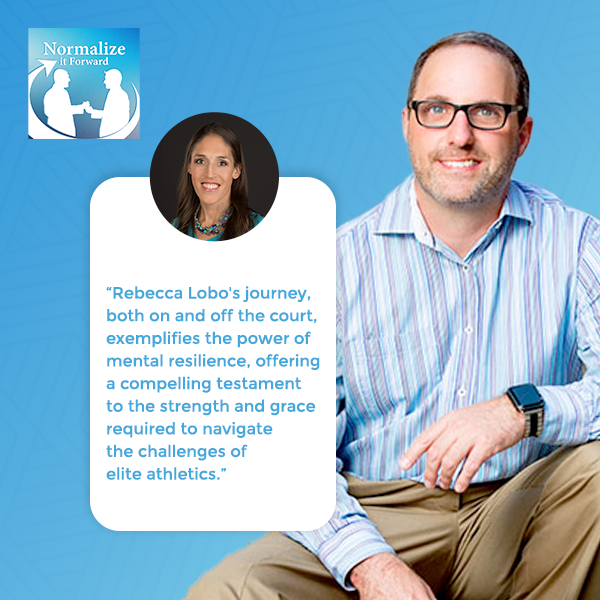
Makes us feel old. Look, we’re wise.
That’s right.
The Changing Landscape Of College Athletics
That’s got a lot of experience. I’m reading through that and I’m thinking, “Much has changed.” Landscape, certainly in college for these kids. Back when we were in school, it just felt less intense, less stressful, and certainly, from the athletic perspective, less intense and less stressful. I guess I just wanted to ask because you’re around now a lot of the players and you see and talk to and hear a lot of what they endure. I guess I just wanted you to compare out loud for us. What do you see?
What’s so crazy is when I was in college, if I wanted to seek out something that had been written about me, I had to go and find the Hartford Courant and purchase it and see what somebody may have said about our game the day before. At least, and I still feel this in life, people don’t generally come up and say to your face something, but they’re completely okay doing it on social media.
People are more likely to say mean things on social media than to your face. Share on XI think that’s the thing that has changed so much, other than maybe occasional heckling on a road trip somewhere in a road arena. I don’t even think that happened in those days. You never really had negative stuff as an athlete in your face about you. It is your coach’s job to point out all of your shortcomings, but not the noise from the outside. That’s the thing that has changed so completely.
You hear a lot of athletes talk now, professional level, college level, to prove people wrong. I’m like, “Who are those people?” They’re the ones actually who don’t matter. They’re the social media. People on social media saying negative things. I don’t think people of my era came up trying to prove others wrong because those others weren’t really in your world. Maybe you got cut from a team, and you were trying to improve yourself and that thing, but you didn’t have that constant narrative of proving people wrong.
Just like a mirror being held up to you all the time. As you said, so many individuals, quite frankly, being negative.
It’s mean.
It really is.
We’re in my world of women’s basketball. It really got pushed to the forefront over the course of the past year with the phenomenon that is Caitlin Clark and the rivalry or whatever that she had with Angel Reese and, like, online, at least the toxicity that now follows, especially the WNBA, and studies have been done. It is the most negative place as people talking about these women’s basketball players. It’s really a scary place to be, especially for some of the younger women who are finding themselves immersed in that world.
It occurred to me recently, I was interviewing a lacrosse coach from IMG Academy down in Florida, and of course, high school level. She was talking about how they feed so many kids into college. I thought, “I wonder how much of this they’re prepared for. Like how much discussion occurs on the high school level. Like here’s what college athletics have become.” I feel like in many cases, kids are surprised, not in a good way. They’re given that opportunity to say, “Wouldn’t it be nice if that didn’t happen?” You go to college, and it does happen. It’s like, that takes, I think, an internally strong individual to be able to tolerate all of that.
That’s interesting to me, and maybe it’s the difference in someone my age versus. This is your area, younger kids is, again, I hear professional athletes talk about it, WNBA, whatever, about some of the real strong negativity that is on their social media feed. You never hear any of them considering stopping going on their social media. I understand especially a big part of that for college athletes and NIL is they’re compensated based on how much they post and that thing. What if you don’t look at your at replies? That’s not a world in which they’re willing to live. It’s almost like there’s all of the negativity exists there, but I’m still going to take a peek.
That’s the thing. I have colleagues and I who have like, “We’re off of X. We’re never looking at mentions again on X.” We might go in post something, but letting negativity be dropped at our doorstep. That months ago, something was sent to me on Twitter, and I read it to my husband, and he’s like, “Rebecca, would you allow that person into your living room?” I said, “No.” He said, “Why are you allowing them into your living room?” It was perfect. I was like, “I’m off, I’m done.” Younger people cannot, for whatever reason, avoid going to those sources and almost in some ways, seeking out feedback from people that don’t even matter in their lives.
The Mental Strength of Elite Athletes & Overcoming Setbacks
It is really interesting. I remember last year with Camp Spencer at UConn, he refused to be on social media. That became part of the interview every time someone approached the guy. It’s like, “Good for him.” He’s figured out like, I don’t need this. My life’s less complicated with it. I wish more kids would do that because I think, in all honesty, it would simplify things. Maybe that’s a good segue to talk about internal anxieties, because I think not only are athletes nowadays facing social media pressures, but they’re facing just general pressure. Here’s a huge question, but I’m curious about your thoughts. How would you say a star athlete in college these days is different from a star athlete in college when you were there?
I think the core of what they are is probably the same. There certainly was zero conversation about mental health when I was coming up. There were times in my career where I tore my knee a couple of times early on in my professional career. In hindsight, I was probably dipping into some areas of, I wouldn’t say depression, but just feeling really cruddy and not easily being able to crawl out of that. I didn’t know it because people weren’t talking about those. I do think that there’s a lot more attention given to athletes’ mental health now.
The conversation around it is good, obviously, but I also think some of the highest-level athletes are the ones who can focus and bust through all of the nonsense. As the pressure gets heavier, they still look unbothered and perform in that way. Not that there’s anything wrong with those who are going through the peaks and valleys, but I think you still find the tippy top of the athletes who have this incredible mental strength wherever it comes from, whether they’re born with it or they’ve trained it where they have a great ability to block out all of the noise and all of the tough times that they’re facing in that moment.
You had mentioned before we got on Diana and so many other great women that have come through the UConn program over the years. I got to imagine there are expectations. The next big player that comes through, everybody’s expecting that person to score X number of points and win X number of games. Sometimes it happens, and sometimes it doesn’t. I think in athletics, as I always say to my students that I work with, you’re bringing your brain with you on the court, on the field.
You’re either going to rise to the occasion, and your production is going to go up, or you’re going to have a hard time, and your production is going to go down. As a simple fan, I always felt for a basketball player, certainly in the waning moments of the game, when there’s a fall call, then you’re on the line. It’s like, “Rebecca, you’re going to either sink these or you’re not.” You’re smiling.
You’re going to sink.
You’ve been there. That’s right. It’s going to go one way or the other. The whole place is going to either cheer you on or come down on you. To me, it’s like, I don’t ever remember that amount of pressure when I was that age in college. I think college athletics has definitely taken off. As you said with the NILs, it’s next level now where there’s a lot of finances involved and good for athletes in my opinion that that’s happening, but does equate to a lot of pressure.
The UConn Program & Building Mental Toughness In Athletes
For sure. One of the things though, like Coach Auriemma, a lot of great players have come out of UConn, one of the best programs in the history of all women’s college basketball of all of sports. There’s no coincidence. People will say he gets some of the best players. Yes, but he also forges the best players and the strongest bodies and minds.
One of the ways he does that is put his players in sometimes impossible positions in practice, especially when they’re physically fatigued, because that’s when you start making poor decisions. Year after year after year, he would do that, and it’s hard on athletes. There are plenty of times I left practice, went back, and was crying and just feeling like I’d underperformed. Why is he yelling at me? Why is he so hard on me? I know there are a lot of athletes who have felt that way as well.
All of us, later on in our college career playing for him and then afterwards, just have a different level of mental fortitude that helps us get through the hard things in life. What’s interesting is the delicate balance of it for him because as a coach, you have to be demanding, and you have to expect really hard things from your players. You have to put them in situations where it’s hard physically, where it’s hard mentally, where it’s hard emotionally, so that you can help them become stronger in those moments. At the same time, do it in a way where it’s not any mental or emotional abuse.
That’s the wizardry of him.
Yes, 100%. It’s the fine line that he has been able to walk almost impeccably for the course of the last 40 years.
Just amazing. For those individuals that follow Yukon, it’s amazing how long that’s gone on for the length of time and the success that they’ve had. Rebecca, let’s do this. Let’s take off the athlete hat and put on the mom hat for a sec. You’ve got kids in college. You’ve got kids in high school. You’re around athletes often. You’re around, I’m sure, your kids’ friends often. These days, it’s hard being in high school. It’s hard being a young adult. I think it’s hard being in college. I guess I’m curious your viewpoint on, like, where do you see the large amount of stresses coming from for young people?
Parenting & The Role Of Pressure In Youth Sports
From their parents, of course.
We get the blame.
The expectations and plenty of people said that, but they have said this, but like the ones who ruin youth sports are the parents. It’s not the kids. Kids are out there. They’re trying to have fun and whatever the weight of expectation is from the sideline or the yelling at the referees or the yelling at the coaches. Oftentimes, you don’t often see kids, whether they’re youth sports all the way through high school or college, say yell at the coach or yell at the referee, their behavior tends to be good.
It’s the parents who’s not. I think you always have to take your kids’ lead. My oldest daughter, who’s a junior in college now, played basketball her freshman year in high school, got to tryouts for sophomore year, and a couple nights going to her room and she was just upset. She said, “I’m not enjoying this. I don’t want to do this.” I was shocked by that. It was a hard thing for me to say because I loved watching her play basketball.
It's often the parents, not the kids, causing problems in youth sports. You have to take your kid’s lead. Share on XI thought she was 6 foot 3 inches and long and had all of this potential. I was like, “Don’t play basketball.” I think sometimes, for parents, it’s about us. I’m going to miss watching her play. That was a decision. I remember at the time thinking, “She’s going to regret this.” Mark, she has not regretted that decision for one second in her life. Probably, she had made it a year earlier, but that can be hard for us because we see the time that they put in when their kids to different sports, and we might see a potential there for something in the future.
She made it clear. She’s like, “I don’t want to play sports in college.” When she had told me that, I was like, it opened up a whole new world to me because I had never considered the possibility that there is a kid on earth who wouldn’t want to play sports in college because I want it so badly. Like, “What?” That’s informed how at least we parented her younger three siblings, too. It’s like always asking them, “Are you still having fun?”
Ultimately, this isn’t the means to an end. This is the end. Let’s enjoy the sport that we’re playing in the moment that we’re playing it without any expectation that it’s going to be something else in the future. Sometimes, for parents, it’s a really hard place to find yourself and to settle into. We still have to remind ourselves of that frequently, but it is the truth. Let them enjoy the moment as a parent enjoys the moment and not project what this is going to mean for them in terms of an athletic career down the road.
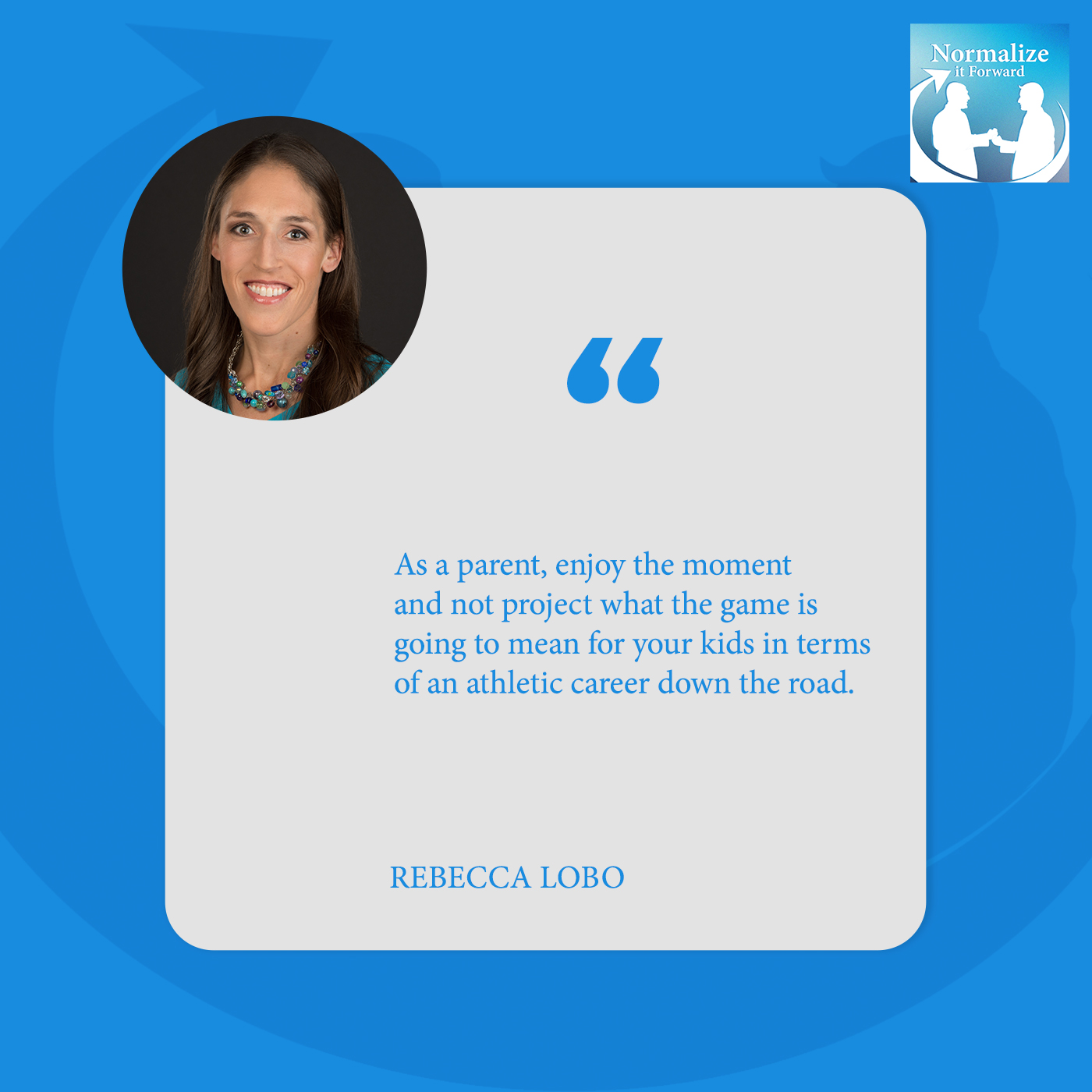
Well said. Great example. I can see. I can imagine that being really a challenge for you. I remember when my son who played baseball the way through stopped and it’s like, “We’re shifting.” I was coaching for a bit. I get it. It’s such a great time to spend. You cherish those memories, but they end. I love what you said, and I think it’s very true. Many parents, unfortunately, equate that path to happiness, like eventual happiness. When you ask your kid, “Are you happy?” You almost ignore their answer. If she looks at you or my son looks at me and says, “I’m not happy,” it’s our job to pivot and help them find other things.
Yes, as their parent, we have to think, is this a decision that they’re going to regret in the future? We also have to, if they tell us, “No, it’s not,” we have to listen and believe them. My whole thing, as long as everything you’re doing, you’re working hard in, and as long as you’re doing the right things as a person and as a student, whatever, I also have to trust that you’re doing the right things. Making this particular decision might be breaking my heart.
The Competitive College Admissions Process & Its Effects On Students
Look, just to shed some light. We live in a very competitive world. When we were at UConn, the amount of applications they would get annually was 15 or 18,000 applications. They were at 58,000 applications this past year. That’s the world we live in where there’s just so much more competition, which makes it even harder for kids to even get into a college or a university. I think that that’s a delicate balance with a parent of like pushing your kid but pushing them in a way that we know that they’re enjoying and there’s some happiness involved.
One of the interesting things with the college application process, when our kids were maybe early on in their high school career, our oldest, and we asked a friend, “Where have your daughters applied to school?” They immediately said, “We’re not telling anyone where our kids have applied because it’s gotten so competitive. Their friends are always asking, “Where did you apply? Did you get in here?” The parents are asking these things too. I remember thinking, “Really? That’s a thing.”
We tried with our kids, like, their tour in college and have very different interests and where they wanted to go, “Which schools are you interested in?” It wasn’t like Ivy League or bust like, where are you going to be happy? Part of that, I think, is informed by my own experience. I could have gone and played basketball at Stanford or Notre Dame or Virginia or whatever. My parents, as teachers and educators in Connecticut, didn’t want me going to UConn.
UConn’s a safety school. Why would you turn down an opportunity to go to an elite academic institution? I know I got an incredible education. I trust that my kids are going to get out of it, whatever they put into it, wherever they end up going, as long as those reasons aren’t, “Maybe I’ll be able to make this team or that team.” No, go to the school that’s going to be the best fit for you. I have to trust that you are going to get a great education out of it.
I was shocked when those parents said it has become such a high-pressure environment for kids applying to schools. Tons of pressure coming from their classmates, tons of pressure coming from other people’s parents, or maybe it’s their own parents, I don’t know. I certainly didn’t want that to become the narrative for my kids when they were trying to decide where they wanted to spend the first four years out of our home.
Good for you for being aware of it. I think there’s a degree as parents that we can control, and there’s clearly part outside of us in terms of social media world we cannot control. To our point from earlier, kids can make those decisions to say, “I’m going to take a three-month hiatus from all social media because that’s just going to be pressure.” I’m going to hear about all of the early decisions and all the kids going doing this and all the kids doing that.
I may be that kid who hasn’t heard back from my colleges. I see that as a therapist every year, which is a tough place, I think, for a young kid to be. We, as parents, we catch the brunt of some of the reasons why kids have lots of anxiety. Let me ask you this. Kids on campus, again, I feel like that environment has changed in some ways dramatically. There’s an intensity, I think, to classes and grades and whatever’s next.
I laugh sometimes that my daughter, who’s finished school, was a freshman. She was a freshman, Rebecca, in her first semester of college. She had a professor come in, and they were talking about grad school. I was like, “You’ve got to be kidding me.” As a freshman, I’m learning at a time like she was like, this kid is just come on, like, just give him a chance. That’s always the mentality of what’s next versus, like, let’s enjoy what’s right in front of us. I’m curious about your thoughts on this because, as a therapist, I see the statistics, unfortunately, moving in all of the wrong directions. The suicide rate is up, which is terrifying to everybody.
Second leading cause of death in this age bracket. Ten years ago, is number twelve, just to give you a reference. Anxiety is way up. Certainly, since COVID, both anxiety and depression are statistically way up. Now, really the majority of kids in college environments are suffering with something. They’ve got something going on. I guess I’m curious, like in the world of parenting, like we’re offsite in some ways at that point. We’re home, they’re at school. What are some of the things kids are dealing with that might be contributing to that at school from your point of view?
How Parents Can Support Their Kids’ Mental Health
I don’t know. I would imagine, and there’s probably plenty of documentation about the effects of social media on all of this. It always blew me away. Our kids, they got their phones once they graduated eighth grade because there was really no time before that that they needed a phone. We were driving them everywhere. their coaches always communicated to the parents.
It wasn’t through the kids. I was always surprised at how few of my kids’ friends were in the same boat. Our kids knew the rule. Once they got the phone, responsibility, meet friends the old fashioned way at high school, then you can get some social media. Hopefully, that was an appropriate timeframe and plan for them. I can only speak to the experience of my own kids. I know that, like my children, who might have some anxiety, we’re born with it.
They come by honestly because I’ve got children who have it, and I have children who don’t. It’s hard sometimes as a parent because I’m not an anxious person. I’ve never been a super anxious person. I’ve even had conversations with one of my kids where she’s worked up and talking to me about things. My response is, you cannot worry about things that might not happen. She’ll say to me, “Mom, that’s the definition of anxiety.”
Yeah, it is.
I’m like, “How can I be a better mother to you? I’m here to listen to you.” There any strategies I can help with, like this is one in college? How can I help you? I cannot. This isn’t part of my fabric. What can I do to help you with this? I didn’t grow up an anxious kid. It’s hard to relate. It’s hard to know what contributes to things, those anxieties.
It’s very much a helpless feeling as a parent because when your kid comes to you and they’re sick, you’re like, “I’ve got this medicine for you. That’s sore. Let me look at it. I think I can diagnose that.” When they come to you with something like this, it’s the worst helpless feeling in the world as a parent because you’re like, what do I do? All I want to be able to do is help my child get through this moment or moments. You feel so helpless with it. Thankfully, we have people like you who can share their advice with the world.
When kids come to you with anxiety issues, it's the worst helpless feeling in the world as a parent because you don’t know what to do. Share on XI’m thankful that you went through that example because, honestly, I think a lot of parents are in those shoes. I do. I think a lot of parents come at this from either the perspective that they have no history of anxiety or depression. If they did, it wasn’t called that when we were kids. It wasn’t labeled, it wasn’t diagnosed, it wasn’t even treated.
Much of this, I think, for the parents that are out there nowadays, it’s the next generation. Kids, thankfully, are getting help some, which is great. It leads me into the topic of wellness because I think wellness is one of those areas that means lots of different things to lots of different people. Wellness includes ways to reduce stress and reduce anxiety. One of the biggest things I talk to my students about that are at school is how are you doing with sleep habits?
How are you doing with eating habits? How are you doing with exercise? Hardly ever do I have a kid who’s doing all three well. Usually, they’re focused on one, and they’re getting good rest but just eating terribly and not getting a lot of physical activity. Wellness, to me, is one of those cornerstones that really anchors people, not just kids, but people in terms of mental health. What does wellness mean to you, Rebecca?
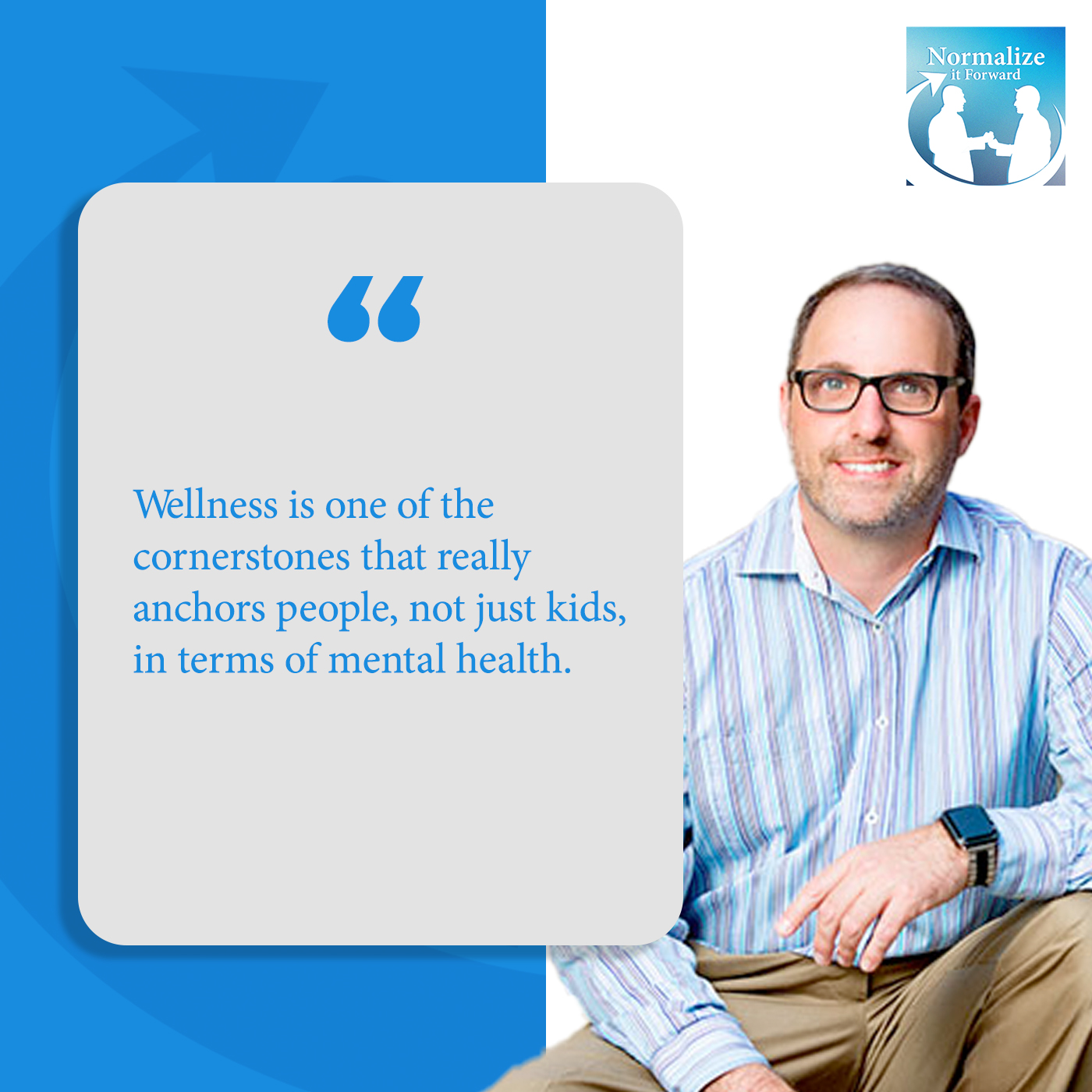
The Importance Of Wellness: Sleep, Exercise & Mental Health
It’s interesting because when you talk about those three things, those are three things that are staples for every high-performing athlete’s life. You’re getting your exercise sleep, especially in the last decade has become paramount for high level athletes. They understand when they monitor their sleep, they understand how important it is to get enough sleep. The diet portion of it has become a huge conversation. I think like that’s one of the things that’s always been a part for me. Even sometimes if my kids are feeling a certain way, it’s like, “Do you notice do you feel better when you exercise? If you do, let’s make it a priority for you to find time to exercise.” Sometimes like especially in the meat of my busiest times of year, whether that’s March men or WNBA playoffs, if I say something like, “I wish I had time to X, Y, or Z. I wish I had time to read.” My husband will look at me and say, “Make time. You make time for the things that are important to you.” I think that’s probably a lesson to try to teach kids is, when do you feel best, what are the things that you do that make you feel best, and prioritize making time for those things?
I like that. Steve is wise.
Yes, he is.
He’s one of my suggestions. I like that. It’s a great concept because I think both for kids and adults, we use those excuses of I cannot possibly do that out of the time. Some of those things, like exercise in particular, is vital. It’s really vital to those individuals who have anxiety to get through the day and feel balanced. A good suggestion. I really appreciate it.
Someone should do a study on marathon runners. I would bet many of them have some level of anxiety, and that’s how they started dealing with it. It’s an interesting point. I’m just thinking, as you said, that over the years, I’ve definitely treated many. It is a go-to for a lot of people. An exercise on any level, as long as you’re moving, I think exercise on any level is just simply good for us.
As we get older, it becomes really critical because it is the difference between stagnation and really developing health issues versus not. I think kids look at it maybe differently than adults do, but we all need it. Certainly, something we all need. That’s for sure. You referenced it before. I know your schedule is super busy, so I appreciate you making the time to come on to the show. Those of you who don’t know, this is actually part two because we had an interview several years ago before this show even started. You were kind enough to give me some time.
That was a lot of years ago.
It was a while ago. You’re always so much fun to talk to and interview. I think you have some great insights. Again, so much has changed, I think, with the landscape of athletics these days. I think you offer a really great perspective on both having been an athlete and now being around them and watching them all the time. Again, thanks for your time. Thank you for making the time. I have one last question for you. Can I put you on the spot?
Sure.
Passing The Torch For The Next Interview
One of the things I do with the show is I ask for people coming on to nominate a friend, a coworker, a relative, really to keep the conversation moving forward. Didn’t know if you had anybody in your world whom you thought would be good for me to interview next. What do you think?
I don’t know. This person is much busier than I am, but perhaps one of the members of the UConn coaching staff would be good to talk to. Morgan Valley is an assistant coach there who played who has young kids of her own that she’s raising. She might be one that would be good to talk to.
I would love it. You guys heard it here. Rebecca’s calling you out. We’ll get them on the show and definitely get their perspective. I would love to hear from them. Thank you again. I appreciate all your time and energy, and good luck to all of the teams as we approach March Madness, coming soon.
Thank you.
Thank you, Rebecca. Take care.
Important Links
About Rebecca Lobo
 Rebecca Lobo is a basketball icon, broadcaster, and advocate for mental wellness. She was a standout at the University of Connecticut, she led the Huskies to their first national championship in 1995 and was named the NCAA Final Four’s Most Outstanding Player. She went on to play professionally in the WNBA, becoming one of the league’s original stars with the New York Liberty.
Rebecca Lobo is a basketball icon, broadcaster, and advocate for mental wellness. She was a standout at the University of Connecticut, she led the Huskies to their first national championship in 1995 and was named the NCAA Final Four’s Most Outstanding Player. She went on to play professionally in the WNBA, becoming one of the league’s original stars with the New York Liberty.
Following her playing career, Rebecca transitioned into broadcasting, becoming a respected analyst for ESPN, where she provides insightful commentary on women’s college and professional basketball. Beyond sports, she has been a vocal advocate for education, wellness, and the power of perseverance. Today, she joins Normalize It Forward to discuss mental resilience, the pressures of high-level athletics, and the importance of prioritizing well-being.

